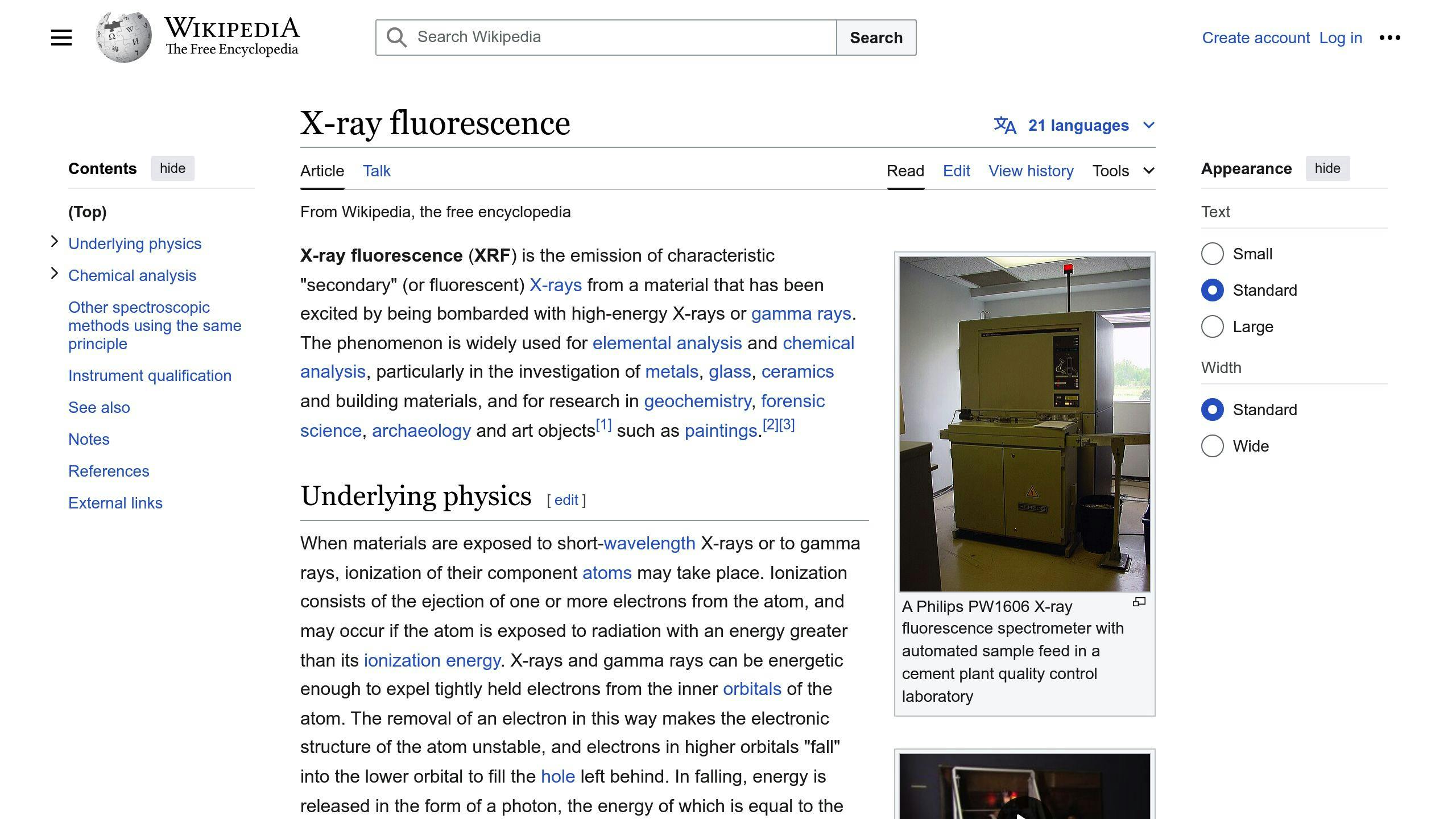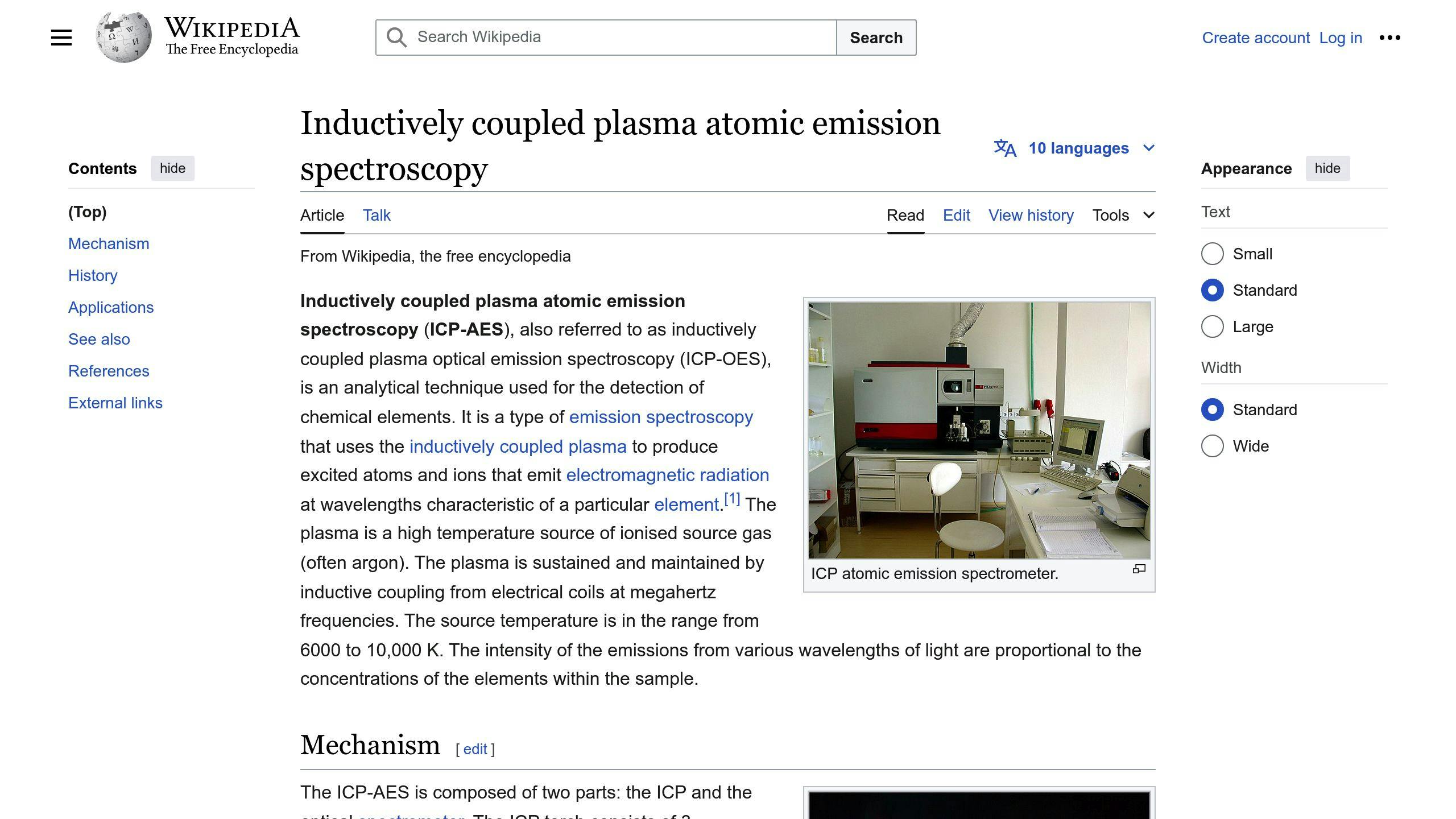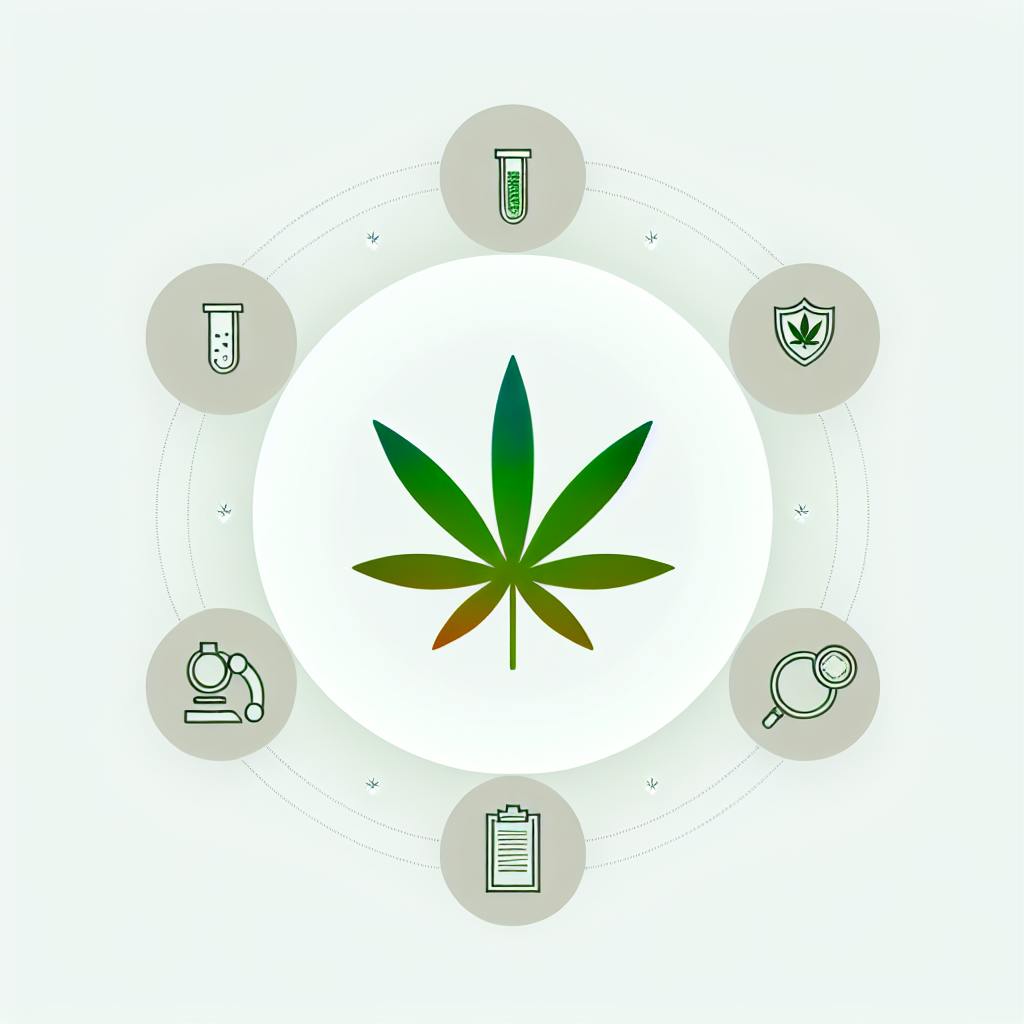Here’s what you need to know about heavy metal testing in cannabis:
• Heavy metal testing checks for toxic metals like arsenic, cadmium, lead, and mercury in cannabis products • Testing is crucial for safety, as these metals can cause serious health issues if consumed • Key testing methods include:
| Method | How it Works |
|---|---|
| ICP-MS | Breaks sample into ions and measures them |
| AAS | Vaporizes sample and measures light absorption |
| XRF | Uses X-rays to detect metals non-destructively |
• Most states require testing for lead, arsenic, mercury, and cadmium • Safe levels vary, but are typically measured in parts per million (ppm) • Growers should test soil, use clean water, and choose low-metal absorbing strains • Consumers should only buy from licensed stores and check labels for test results
This guide covers testing importance, methods, regulations, sample prep, result interpretation, and tips for growers and consumers to ensure cannabis product safety.
Related video from YouTube
Heavy Metals in Cannabis
What Are Heavy Metals?
Heavy metals are elements found in nature that can harm people and animals, even in small amounts. In cannabis, these metals can get into the plant from the soil, water, and air. They can then end up in the final product, which may be unsafe for users.
Common Heavy Metals Found in Cannabis
The main heavy metals often found in cannabis are:
| Metal | Source |
|---|---|
| Arsenic | Soil, water, pesticides |
| Cadmium | Soil, fertilizers |
| Chromium | Soil, industrial pollution |
| Lead | Soil, water, air pollution |
| Mercury | Soil, water, air pollution |
Testing for these metals is key to make sure cannabis products are safe.
How Cannabis Gets Contaminated
Cannabis plants can take in heavy metals in several ways:
- Soil: Plants absorb metals from dirty soil
- Water: Watering with contaminated water adds metals
- Air: Leaves can take in metals from polluted air
- Farming practices: Some fertilizers and pesticides contain heavy metals
Understanding how cannabis gets contaminated helps growers and makers keep their products safe.
Rules for Cannabis Heavy Metal Testing
2024 Testing Rules
In 2024, cannabis products must be tested for heavy metals to keep users safe. Most states check for four main metals:
| Metal | Why It’s Tested |
|---|---|
| Lead | Can harm brain and nerves |
| Arsenic | Can cause cancer |
| Mercury | Can damage organs |
| Cadmium | Can hurt kidneys |
These metals can make people sick if they eat or breathe them in.
Different State Requirements
States have their own rules for testing:
- Most check for the four metals above
- Some states test for more metals
- Testing can happen at different times
For example:
- California also tests for chromium
- Maryland tests twice: when growing and after making products
Cannabis businesses need to know their state’s rules to avoid problems.
Global Testing Standards
As cannabis becomes popular worldwide, testing rules differ:
- No single set of rules for all countries
- Many follow U.S. guidelines, like California’s
- Some countries make their own rules
Having the same rules everywhere could help make cannabis safer for everyone.
How to Test for Heavy Metals
Testing for heavy metals in cannabis is important to keep products safe. Here are the main ways to test:
Atomic Absorption Spectroscopy (AAS)

AAS is a common test. It turns the sample into vapor and measures how much light the atoms absorb. It’s good for finding lead, cadmium, and mercury.
Inductively Coupled Plasma Mass Spectrometry (ICP-MS)

ICP-MS is very accurate. It breaks the sample into ions and measures them. This test can find very small amounts of metals.
X-ray Fluorescence Spectroscopy (XRF)

XRF uses X-rays to check for metals without damaging the sample. It’s fast but might not be as exact as other tests.
Inductively Coupled Plasma Optical Emission Spectroscopy (ICP-OES)

ICP-OES is like ICP-MS but uses light to find metals. It’s also very accurate.
Comparing Testing Methods
Each test has good and bad points:
| Test | Good Points | Bad Points |
|---|---|---|
| AAS | Costs less | Not as sensitive |
| ICP-MS | Very sensitive | More expensive |
| XRF | Quick | Less accurate |
| ICP-OES | Very accurate | Can be costly |
Cannabis companies should pick the best test for their needs. They need to think about what they’re testing, how exact they need to be, and how much they can spend.
Preparing Samples for Testing
Getting samples ready for heavy metal testing is key to getting good results. This part talks about why good samples matter, how to make them, and how to keep them clean.
Why Good Samples Matter
Good samples are needed to make sure test results show what’s really in the cannabis product. Bad samples can lead to:
- Wrong test results
- Product recalls
- Possible harm to users
Good samples also help avoid dirt or other things getting into them, which can mess up the results.
How to Make Samples
To make samples for heavy metal testing:
- Mix the cannabis material well
- Break down the sample using acid or other methods
- Test the liquid using machines like ICP-MS or AAS
It’s important to follow the same steps each time to get good results.
Keeping Samples Clean
Samples can get dirty at any point from when they’re collected to when they’re tested. To keep them clean:
| What to Do | Why It Helps |
|---|---|
| Use clean tools | Stops dirt from getting in |
| Wear gloves | Keeps hands from touching samples |
| Work in a clean place | Reduces chance of dirt getting in |
| Label samples clearly | Prevents mix-ups |
| Store samples properly | Stops samples from touching each other |
Understanding Test Results
Getting clear test results is key to making sure cannabis products are safe. This part explains how to read test reports, what safe levels are, and what to do if levels are too high.
Reading Test Reports
Test reports have important information. Here’s what you’ll find:
| Part | What It Means |
|---|---|
| Sample ID | A number that shows which sample was tested |
| Test Date | When the test happened |
| Test Method | How the test was done (like ICP-MS or AAS) |
| Heavy Metal Levels | How much of each metal was found |
| Detection Limit | The smallest amount the test can find |
| Units | How the amounts are measured (like ppm or ppb) |
Safe Heavy Metal Levels
Different products have different safe levels. Smoked products have stricter rules than eaten ones. Here are the safe levels set by California:
| Heavy Metal | Safe Level (ppm) |
|---|---|
| Arsenic | 0.02 |
| Cadmium | 0.1 |
| Lead | 0.5 |
| Mercury | 0.1 |
What to Do if Levels Are Too High
If tests show too much heavy metal, you need to act fast:
- Take the product off the market
- Get rid of the bad product
- Find out why there’s too much metal
- Make changes to stop it from happening again
These steps help keep users safe.
sbb-itb-430f9b7
Ensuring Accurate Testing
Good testing is key to making sure cannabis products are safe. Here’s how to get good test results:
Lab Certification
Pick labs with good certifications:
| Certification | What It Means |
|---|---|
| ISO/IEC 17025 | Best quality for testing labs |
| Perry Johnson or A2LA | Groups that check labs |
These show the lab does good work.
Testing Between Labs
Send the same sample to different labs. This helps:
- Find mistakes
- Make sure results match
Quality Control Steps
Good labs do these things:
| Step | Why It’s Important |
|---|---|
| Clean sample prep | Keeps dirt out |
| Check machines often | Makes sure they work right |
| Test the tests | Makes sure the way they test works |
| Look at results again | Finds mistakes |
These steps help make sure the test results are right.
Problems with Heavy Metal Testing
Testing for heavy metals in cannabis can be tricky. Here are some main issues:
Cannabis Complexity Issues
Cannabis is hard to test because:
- It has many parts that can mix up test results
- Different types of cannabis have different amounts of chemicals
- These chemicals can make it hard to find heavy metals
Finding Very Small Amounts
It’s tough to spot tiny bits of heavy metals in cannabis:
- You need very good tools
- People doing the tests must know a lot
- Even small mistakes can change the results
Differences in Cannabis Products
Not all cannabis products are the same, which makes testing hard:
| Product Type | Testing Challenge |
|---|---|
| Flowers | Need to test the plant parts |
| Edibles | Food ingredients can affect tests |
| Concentrates | Very strong, need special testing |
| Topicals | Creams and oils are hard to test |
Each type needs its own way of testing to make sure it’s safe.
These problems show why it’s important to use good labs and the right ways to test. This helps make sure the test results are correct and trustworthy.
New Testing Methods
The cannabis industry keeps changing, and so does heavy metal testing. New ways to test are making it easier to find heavy metals in cannabis.
Better Testing Tools
New tools can find even smaller amounts of heavy metals. This helps make sure cannabis products are safer for people to use.
Testing Where Plants Grow
Some labs now test at farms where cannabis grows. This helps farmers check their soil and plants often. They can find problems with heavy metals early.
Using Computers to Read Results
Computers are now helping to read test results. This makes testing faster and less likely to have mistakes. It also lets lab workers do other important jobs.
| New Method | What It Does | Why It Helps |
|---|---|---|
| Better Tools | Find smaller amounts of metals | Makes products safer |
| Farm Testing | Checks soil and plants at farms | Finds problems early |
| Computer Reading | Reads test results quickly | Fewer mistakes, faster results |
These new ways of testing help make sure cannabis products are safe to use. By using the newest tools and methods, labs can test better and faster. This helps people feel more sure about the cannabis products they buy.
Tips for Cannabis Growers
Growing safe cannabis means keeping heavy metals out. Here’s how growers can do this:
Stopping Heavy Metal Buildup
To keep heavy metals away:
| Action | Why It Helps |
|---|---|
| Pick the right cannabis types | Some plants take in less metal |
| Choose clean land | Avoid old factory sites |
| Check air quality | Make sure the air is clean |
| Test soil pH often | Right pH stops plants from taking in metals |
How Often to Test
Test crops a lot:
- Check at different growth stages
- Find problems early
- Fix issues fast
Fixing Contamination Problems
If you find heavy metals:
- Take out bad soil or plants
- Use natural stuff to clean the soil
- Change how you farm
- Work with labs to make a plan
| Step | What to Do |
|---|---|
| Remove | Get rid of dirty soil and plants |
| Clean | Use natural things to clean the soil |
| Change | Farm differently to stop future problems |
| Plan | Make a testing plan with experts |
What Consumers Should Know
As someone who buys cannabis, you need to know about heavy metals in these products. Here’s what to look out for:
Reading Product Labels
When you buy cannabis:
- Check the label for heavy metal test results
- Look at the levels of metals found
- Don’t buy products without this info
Buying from Licensed Stores
Only buy from stores with proper licenses. These shops:
- Must follow testing rules
- Are less likely to sell unsafe products
Health Risks of Heavy Metals
Too much heavy metal can hurt you. Here’s what can happen:
| Metal | Possible Health Problems |
|---|---|
| Lead | Brain and nerve damage |
| Arsenic | Cancer |
| Mercury | Kidney and brain issues |
To stay safe:
- Know these risks
- Choose tested products
- Buy from trusted stores
Wrap-up
Heavy metal testing is key to keeping cannabis products safe. Let’s sum up what we’ve learned:
Why Testing Matters
Heavy metals in cannabis can hurt your health. The main ones to watch for are:
| Metal | Health Risk |
|---|---|
| Lead | Brain damage |
| Mercury | Kidney problems |
| Cadmium | Organ damage |
| Arsenic | Cancer |
What to Remember
- Testing is a must: It finds harmful metals in cannabis.
- Rules are important: They set safe levels for heavy metals.
- Testing methods matter: Good tests find even tiny amounts of metals.
Tips for Buyers
- Look for test results on labels
- Buy from licensed stores only
- Know the risks of heavy metals
Final Thoughts
By knowing about heavy metal testing, you can choose safer cannabis products. Always pick tested items from trusted stores. This helps you stay safe while using cannabis.
Remember: Good testing leads to safer products for everyone.
FAQs
How do you test for heavy metals in cannabis?
Labs use special tools to find heavy metals in cannabis. Here are the main ways:
| Test Method | How It Works |
|---|---|
| ICP-MS | Breaks down sample into tiny bits and counts metals |
| AAS | Turns sample into gas and measures light absorbed |
| XRF | Uses X-rays to find metals without damaging sample |
These tests can spot even small amounts of heavy metals.
What are the heavy metal tests for cannabis?
Cannabis is usually tested for four main heavy metals:
| Metal | Why It’s Tested |
|---|---|
| Arsenic | Can cause cancer |
| Cadmium | Harms kidneys |
| Lead | Hurts brain and nerves |
| Mercury | Damages organs |
Testing for these metals helps make sure cannabis is safe to use and follows the rules set by states and the government.
Related posts
- Cannabis Potency Testing Standards & Regulations
- Cannabis Testing Lab Setup: Step-by-Step Guide
- Cannabis Pesticide Residue Testing: Regulations & Methods
- Cannabis Testing: 5 Ways It Ensures Consumer Safety

